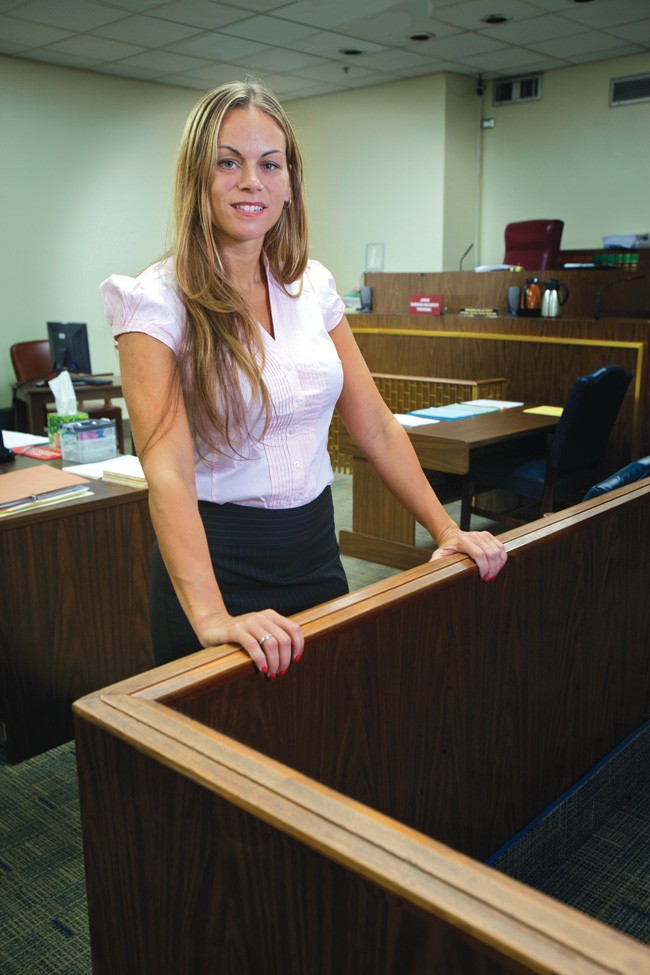Though Jessica Chiappone graduated from law school in Florida, she is not allowed to practice law here. Thirteen years ago, when the Nova Southeastern University alumna was 20 years old, she was convicted of “conspiracy to possess with intent to distribute” cocaine. She’s been out of prison for more than a decade, but her right to vote, hold public office and sit on a jury – rights required of a Florida Bar applicant – have still not been restored by the state.
“I have to take paralegal positions,” says Chiappone, who graduated earlier this year.
Chiappone has been waiting more than three years for the restoration of her rights, but thanks to a new political guard in Tallahassee, she will have to wait longer. On March 9, the state’s Board of Executive Clemency – comprised of Gov. Rick Scott, Attorney General Pam Bondi, Chief Financial Officer Jeff Atwater and Commissioner of Agriculture and Consumer Services Adam Putnam (all Republicans) – voted unanimously to impose new requirements on the nearly 90,000 ex-felons in Florida trying to get their civil rights restored. Under Gov. Charlie Crist, the rights of the majority of non-violent felons were restored upon leaving prison. Under the new rules, those leaving prison after a felony conviction have to wait a minimum of five years before they can even apply to have their rights restored. Those guilty of “more serious” offenses, like aggravated child abuse, have to wait a minimum of seven years, and in addition, are asked to stand before the governor of Florida in a hearing held by the board. “It’s what I consider an intimate decision-making process,” says attorney Robert Williams, who advises Commissioner Putnam on individual rights-restoration applications.
The changes to the rights-restoration rules were the topic of discussion for Chiappone and others who gathered at Orlando’s DoubleTree Hotel on Aug. 19 and 20 for the annual convening of the Florida Rights Restoration Coalition, a group affiliated with the American Civil Liberties Union. There, activists, lawyers and ex-felons gathered to discuss how to bring Florida back in line with the 46 other states that don’t require ex-felons to ask the executive branch to return their civil rights. The coalition is planning a series of local and regional rallies in the coming months, leading up to a statewide rally in Tallahassee next year.
The subject of the discussion on Saturday morning was the workings of the new process. After the requisite five- or seven-year waiting period is met, an ex-felon must submit an application to the Florida Parole Commission, which investigates the merits of each case on a “first-in, first-out” basis. (The commission restored the civil rights of 77 percent fewer people last year than it did in 2009, largely because of budget cuts.) The commission then makes a recommendation to the Board of Executive Clemency, which meets four times per year and (eventually) makes the final decision on each case.
Tallahassee-based civil rights attorney Mark Schlakman says that the new rules are retroactive. The commission’s current backlog of those awaiting rights restoration stood at 89,833 as of Aug. 1, and the Parole Commission must now mail letters to these ex-felons to explain the new process. “The clemency rules are unlike virtually any other set of rules that we have,” Schlakman says. “They are whatever the governor and cabinet want them to be at the time.”
Howard Simon, executive director of the ACLU of Florida, notes that policy on rights restoration “bounces back and forth” between different governors – under Charlie Crist, for instance, some felons exiting prison were eligible for automatic rights restoration. “Your right to vote depends on who’s in office,” Simon says.
Attorney General Bondi has publicly defended the new rules, arguing that ex-felons should have to prove they can lead a crime-free life after prison. “She believes that rights of felons should be restored with the test of time,” says Bondi’s spokeswoman, Jennifer Davis.
In arguing against the new process, the St. Petersburg Times pointed to a recent study by the Parole Commission, which found that only 11.1 percent of people whose rights were restored in 2009 and 2010 had returned to Department of Corrections custody by May 31 of this year. The state’s overall recidivism rate, on the other hand, was last measured in 2009 at 33.1 percent.
But others argue it’s an apples-and-oranges comparison; the recidivism rate is based on a three-year window, while the subjects of the Parole Commission’s study had been out of prison for as little as five months. “You can spin it any way you want to,” says Jane Tillman, the Parole Commission’s communications director.
For Jessica Chiappone, however, there’s no need to cite disputed numbers. Instead, the mother of two makes a philosophical argument. “What is the prison sentence if it’s not meant to be punishment?” she says. “Should I be punished for the rest of my life?”



















